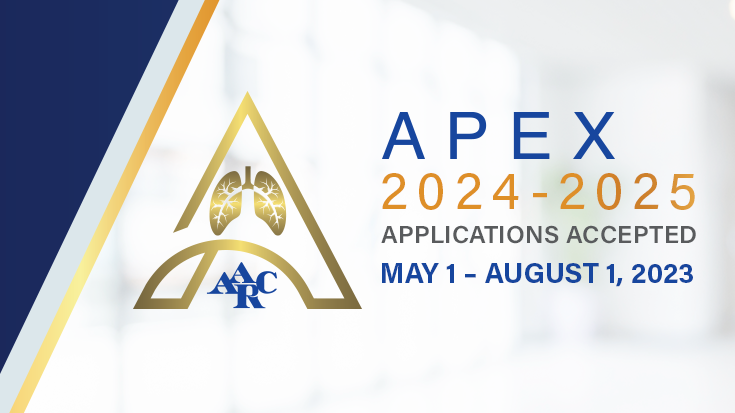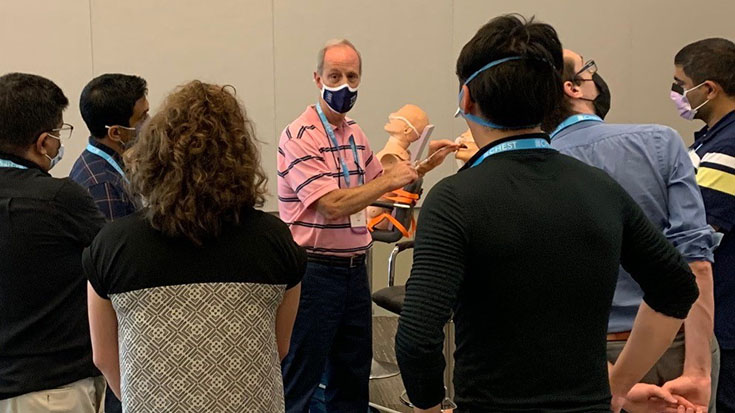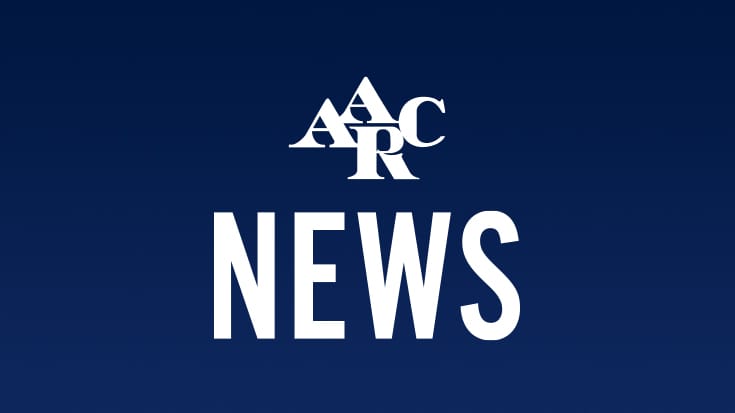
The AARC is accepting applications now through Aug. 1, 2023 for the 2024-2025 Apex Recognition Award. Acute care hospitals, long-term care facilities, home equipment companies, educational programs, and dedicated transport teams are all invited to apply. What goes into a successful application? Managers and educators whose facilities recently received the Apex Recognition Award share their experiences.
The Commission on Accreditation for Respiratory Care accredits respiratory care educational programs, and students can rest assured their programs have met high standards. Apex recognition from the AARC builds on those high standards by recognizing educational programs that have risen to even higher levels by meeting or exceeding 19 separate requirements denoting superior performance in respiratory care education.
In this interview, recent Apex recipients in the education category, Tom Jones, MEd, RRT, CPFT, from the University of Arkansas for Medical Sciences, Megan Koster, EdD, RRT, RRT-NPS, from Boise State University, and Jennifer Keely, MEd, RRT, RRT-ACCS, from the University of Missouri, offer insights they’ve gained from going through the extensive application process.
First, tell us why your RT program decided to apply for Apex recognition from the AARC and what it has meant to your program and school to receive the honor.
Tom Jones: Demonstrating excellence is part of our program’s culture. We believe the Apex award is an objective measure of excellence by a trusted evaluation team. The Apex criteria for disease management, research, and education highlight the distinctive areas in our traditional BS degree and AS-BS degree advancement curriculum.
In addition, our program works closely with excellent clinical affiliate partners who are consistent Apex award recipients. The Apex award for educational programs illustrates how affiliates and programs share the same goals for advancement of the profession. Receiving the Apex award makes a statement to the university leadership about the quality of our program, the experience and excellence of the faculty, and the comprehensive preparation future respiratory care professionals receive at UAMS.
Megan Koster: We chose to pursue the Apex award because there are so few recognition programs for respiratory care. This, coupled with the continued lack of awareness of our profession, means that we must take advantage of every opportunity to highlight respiratory care and respiratory care practitioners. I work with amazing educators, staff, and students who deserve to be recognized for the work they do and the dedication to the advancement of the profession that they’ve demonstrated by pursuing an advanced degree. So we really pursued the award to celebrate them.
Receiving the award has substantiated the quality of our programming to the university administration as well, and has allowed us to advocate for our faculty, staff, and students in a way that may not have been taken as seriously without such accolades. It has certainly legitimized us to a point wherein we no longer feel apprehensive to ask for a “seat at the table,” so to speak.
Jennifer Keely: We have received the Apex recognition in previous years. I knew that our program still met the criteria, so it was important to me to make sure we submitted an application again this year. Apex recognition has been slow to catch on in terms of the broader RT community, but awards like this help to deepen the profession, if that makes sense. If more programs and hospitals strive to meet the Apex requirements, that can only elevate our collective and individual professional identities as RTs.
The application process is extensive, requiring programs to meet 19 Requirements. How many people on your faculty/staff were involved in helping to collect and organize all the evidence that you were required to submit?
Tom Jones: I appointed a primary facilitator who was responsible for compiling the documentation. She included the project as part of her documented workload. The rest of the faculty were helpful in responding to her requests for documentation from their respective courses and personal records. The project facilitator worked with the administrative assistant and chair to compile, prepare, and review the documentation for submission. A total of six people were involved (all of our faculty), but only two had much to do with the ongoing process.
Megan Koster: I did the majority of the work due to my position as program director. I know this program intimately. I felt that it would be unfair to overburden faculty and staff who did not have the bandwidth for an added “ask.” However, my team was incredibly responsive and helpful with providing documentation related to the standards, which made the compilation of the application much more feasible. In the future, I will ask for assistance with the application because I believe it’s a wonderful opportunity to mentor a future leader through a process that can be scary without a little bit of guidance.
Jennifer Keely: Honestly, it wasn’t that extensive for us since we had documentation from a previous year and we just went through CoARC accreditation last year. So most of the documents were easily gathered. At one point, each faculty member had to provide me with their CV, and my predecessor did the footwork in terms of writing narratives for how different courses met various criteria. Our student support person helped to gather course evaluations and our finance department paid the invoice. I gathered everything and submitted it. Everyone is busy, so I only asked for the bare minimum from people.
Some of the requirements pertain to specific operational aspects of your program. How difficult was it to gather all this information and what did you learn along the way about how best to go about it?
Tom Jones: Because of the way we collect and save program documentation, it wasn’t difficult to gather the information — especially since the project facilitator is a full time faculty member with a great deal of historical program knowledge. Since we were honored previously, we already had a documentation template and process in place that made this much easier. The most useful tool we have is our curriculum map, so evidence for all academic standards can be easily located and retrieved. We chose to present the best, single piece of evidence of meeting the criteria — we didn’t try to include every way we met the standard.
Megan Koster: I felt very fortunate to have been able to develop the program that I represent. Because of this, and the fact that we are accredited by CoARC, much of the documentation already existed in one form or another, so I was able to pull pieces from different documents to compile for the application for the Apex award. As program director, I am responsible for every aspect of the program on a continuous basis, so I have learned to keep items as up-to-date as possible, so that when a reporting request comes through, it is not a huge undertaking to update “old” information. One of the benefits of working through the application process is that it allows you to take a moment to consider your programming and ask, “What’s still working well?”, “What could be revised?”, or “Is this still relevant?”; “Is this still what my students need?”
Jennifer Keely: We keep pretty close tabs on course content to make sure that we are addressing things like research, disease management, patient education, and evidence-based practice in our courses. Again, the accreditation process provided an excellent opportunity for me to double-check with faculty to make sure certain aspects of the course, in terms of course content, are still in place. Revisions we make to courses tie back to things like this. For example, if we want to eliminate our patient education course, we know we still have to include that content in other courses where it makes sense. This helps us streamline our courses, but also ensures that we cover the content that is essential to prepare our students well.
What advice do these educators have for their fellow educators considering an Apex application? We asked each of them to give us their top five tips, and here’s what they had to say —
Tom Jones
- Complete a curriculum map to track everything in the program curriculum, and update it annually. It makes it easier to locate and decide on the strongest documentation.
- Select a project facilitator who has broad knowledge about the program curriculum, policies, and processes. They will likely know where to find information and how to write holistic narratives that describe how the program meets the criteria.
- Provide workload credit/release time for the project facilitator to complete the process, planning ahead so they can accomplish the task when it is least disruptive to their regular responsibilities.
- Provide the single best quality of evidence (or 2-3 pieces maximum) as documentation for each standard. This helps the evaluation team move quickly through the documentation files and evaluation process.
- Have an independent reviewer compare the application criteria to the evidence provided prior to submission.
Megan Koster
- Start early! That way, it won’t be so stressful.
- Keep great records.
- Revise curriculum or make changes in the most thoughtful way possible.
- Communicate your needs/asks clearly and in a way that you would want to be communicated with.
- Use this opportunity to get your faculty and stakeholders involved.
Jennifer Keely
- If you haven’t recently gone through accreditation, think of the Apex application as a mini-prep for the accreditation process. Much of the documentation will apply for accreditation, or, at least, will help you create a shell that will be helpful in the future.
- I suspect many RT programs have the same problem of being overlooked at their institutions, especially in a big university. Administrators do pay attention to awards, though, especially if they bring national recognition. Keep that in mind if you’re trying to decide if the application is worth the time and money. Positive attention from administrators is never a bad thing!
- When hiring new faculty, especially adjuncts, make sure to consider if they have advanced credentials. It can be hard sometimes to find adjuncts who do, and/or who are willing and able to get them quickly. Of course, we want to encourage all faculty who teach for us to develop themselves professionally to broaden their expertise and provide good examples for the students. If you are hiring several adjunct faculty without advanced credentials, that will affect your qualification for the award.
- Don’t wait until the last minute to compile everything or else you’ll drive everyone who works with you nuts as you make frantic requests for documentation.
- Even if you think Apex recognition doesn’t matter because many people don’t know what it is, consider what it means for your students and your alumni when you can tell them that yours is an Apex program. It will matter.
Learn much more about the Apex Recognition Award from the AARC here. The 2024-2025 application cycle is open now and the final deadline to submit evidence for the 2023-2024 application cycle is Aug. 1, 2023.
Email newsroom@aarc.org with questions or comments, we’d love to hear from you.














